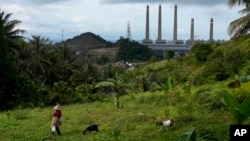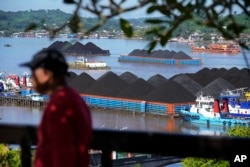Indonesia is one of the world's largest coal-producing countries. But it has agreed to reduce its use of fossil fuels in the coming years.
Indonesia reached five agreements to reduce its emissions of carbon gases last year. These included the $20 billion Just Energy Transition Partnership (JETP) deal. It was reached during the Group of 20 meeting in Bali last November. The deal aims to turn one of the largest coal-producing countries toward clean energy resources. But experts warn many difficulties need to be overcome.
David Elzinga is with the Asian Development Bank. He said that Indonesia's energy transition is “very unique.” That is because of the country’s high economic growth, geography, population centers and possibilities for “clean energy,” he said.
Indonesia has the ability to create electricity from the sun, dams, the Earth’s heat, and wind. But the International Renewable Energy Agency says only about 12 percent of its energy potential is used. Nearly all energy demand is met by coal, gas, and oil, with 60 percent coming from coal.
The International Energy Agency says that, in 2021, Indonesia's emissions from the energy industry equaled around 600 million tons of carbon dioxide. That is the world’s ninth highest emissions total. Indonesia has the world’s fourth largest population. Its population and economic growth are expected to increase the country's energy use by three times by 2050.
Elzinga said it is hard to make changes when there is such large growth. Many more-developed economies have bigger goals for renewable energy. But researchers say no country is currently meeting world climate goals.
Indonesian officials have started to change. For example, they have announced new rules for solar energy. They have also set a goal to increase electric car sales to 25 percent of total vehicle sales by 2030. But experts warn Indonesia is behind other Southeast Asian nations.
With the JETP deal, Indonesia is promising to reach “net zero” emissions from its power industry by 2050. That means the country promises to balance the carbon emissions released with carbon that is collected.
Indonesia is also promising that renewable energy will make up over one third of all power creation by 2030.
But Elrika Hamdi said financing remains a problem. She is an energy finance expert at the Institute for Energy Economics and Financial Analysis. One estimate says Indonesia will need up to $2.4 trillion in investment across its energy system by 2050.
“We still have a long way to go to find out...how we could gather up the financing to do this,” said Hamdi.
Another concern raised by activists is that the JETP deal does not make clear whether Indonesia would face any restrictions for building new coal plants. A 2022 presidential rule permits coal plants that were planned earlier to be built.
Coal is a valuable part of Indonesia's economy. The country is the largest exporter by weight in the world. The war in Ukraine has also caused an increase in energy prices. High prices will likely remain for the next two or three years, Hamdi said.
“You can understand the rationale for them wanting to develop their industries and their natural resources,” Elzinga said.
PLN is Indonesia’s state-owned electricity company. In a statement to The Associated Press, the chief of PLN said that the company has already cancelled some coal power plants. The official said he is “committed to lead the energy transition in Indonesia.”
Daniel Kurniawan is a researcher for the Institute for Essential Services Reform based in the capital Jakarta. He said Indonesia has not developed a strong solar energy policy. He said there is a lack of political will for Indonesia to move away from coal power.
But, he added, “That is bound to change with JETP.”
Muliawan Margadana is with the Indonesia Mining Association. He raised concerns over communities dependent on the coal industry. In East Kalimantan, for example, coal makes up 35 percent of the economy and employs nearly nine percent of the population.
But Margadana and Hamdi said that retraining workers is possible.
The money should be spent “to help these impacted workers, whether through upskilling, reskilling, or community development,” added Hamdi.
I’m Dan Novak.
Dan Novak adapted this story for VOA Learning English based on reporting by The Associated Press.
_____________________________________________________________________
Words in This Story
emissions — n. (pl.) things that are released into the environment such as gases or (sometimes) radiation
transition — n. a change from one form to another
infrastructure — n. the structures needed for a modern civilization such as roads, bridges, power centers, water plants and so on
unique — adj. something of which there is only one
potential — n. something that is not realized yet, but is possible in the future
net-zero — n. a term for an exact balance between the release of something and the collection of something so that nothing additional is added to the system
rationale — n. a reason or way of thinking that explains an action
committed — adj. willing to give time, money or energy for some cause







Forum